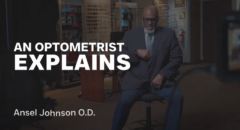
Most people have heard about glaucoma and cataracts, but there’s another eye disease that senior citizens should know about, especially those of European descent. This is macular degeneration, or damage to the macula, an ultrasensitive part of your retina that gives you sharp focus in the center of your vision. If you develop this condition, you may have trouble driving, reading, recognizing people, or other activities that require fine central vision. You may eventually experience major vision loss. Macular degeneration affects more than 1.75 million Americans and is the leading cause of legal blindness in older Americans. It’s important to know, though, that macular degeneration almost never causes complete blindness. In fact, most patients who have the disease can continue to live productive and independent lives.
What is Macular Degeneration?
There are two basic types of macular degeneration, known as “dry” and “wet.” About 90 percent of all cases are the dry sort, in which the macula has simply grown thin over the years. The dry form progresses very slowly and may never interfere with a person’s life. Many people simply notice that their vision fades a bit when they read. The wet form of macular degeneration is much more serious. In this case, abnormal blood vessels grow beneath the retina and start to leak, creating a pool of blood and other fluids that damage your retina and block your vision. Occasionally, a dry case can turn wet. If you have the dry form, see an ophthalmologist immediately if your vision suddenly worsens.
Macular Degeneration Symptoms
Macular degeneration, whether it’s the dry or wet form, typically begins with subtle changes in vision that can gradually worsen over time. In its early stages, the symptoms may be mild and easy to dismiss, but recognizing them early is crucial to preserving vision. Both types of macular degeneration affect the macula — the central part of the retina responsible for sharp, detailed vision — and share many of the same initial warning signs.
Here are some of the most common symptoms of Macular degeneration:
-
Blurry or Fuzzy Vision: One of the earliest signs is a general blurriness or fuzziness in your central vision, making it difficult to read, recognize faces, or drive.
-
Distorted Vision (Metamorphopsia): Straight lines may begin to appear wavy or bent. For example, sentences in a book may no longer line up properly, or the edges of buildings might look warped.
-
Dark or Empty Areas in Central Vision: You might notice blank or shadowy spots appearing in the center of your field of view. These areas may small and expand over time, making everyday tasks more challenging.
-
Difficulty with Color Perception or Contrast: Colors might appear faded or less vibrant, and distinguishing between shades can become harder, especially in low light.
-
Increased Sensitivity to Glare: Bright light may become uncomfortable, and you may notice halos or glare interfering with your vision, particularly while driving at night.
If you experience any of these symptoms, it’s important to schedule an appointment with an ophthalmologist as soon as possible. Early detection and intervention can help slow the progression of the disease and protect your remaining vision.

Types of Age-Related Macular Degeneration
According to John Hopkins Medicine, there are two primary types of age-related macular degeneration have different causes:
- Dry macular degeneration. This type is the most common. About 80% of those with AMD have the dry form. Its exact cause is unknown, although both genetic and environmental factors are thought to play a role. This happens as the light-sensitive cells in the macula slowly break down, generally one eye at a time. The loss of vision in this condition is usually slow and gradual. It is believed that the age-related damage of an important support membrane under the retina contributes to dry age-related macular degeneration.
- Wet macular dgeneration. Though this type is less common, it usually leads to more severe vision loss in patients than dry AMD. It is the most common cause of severe loss of vision. Wet AMD happens when abnormal blood vessels start to grow beneath the retina. They leak fluid and blood — hence the name wet AMD — and can create a large blind spot in the center of the visual field.
What Causes Macular Degeneration?
Age is by far the biggest risk factor for macular degeneration, although some rare forms of the disease can strike at any age. The disease sometimes develops during a person’s forties or fifties, but it’s much more common in people over 60.
The disease is rare among nonwhites. Some experts believe that excess exposure to ultraviolet rays can cause macular degeneration. This risk has not been proven, but a lifetime of sun worship without eye protection will definitely increase your risk of cataracts.
Is Macular Degeneration Herditary?
Yes. Macular degeneration runs in families, so be on guard if your parents or siblings have the condition. It’s also more common in women, smokers, and people with light-colored eyes. Those with cardiovascular disease also appear to be at higher risk.
RELATED: What’s Your Vision of the Future? 7 Tips For Healthier Eyes
How is Macular Degeneration Diagnosed?
A simple at-home test can help you detect macular degeneration before symptoms set in. You’ll need a special card that features a grid of straight lines with a dot in the center. This card, called a Yannuzzi card, is available from your doctor, and any person older than 50 should have one. Here’s how you use it: With your face 14 inches away from the card, close one eye and look at the dot. (Many people age 50 and older will need to use reading glasses.) If you have macular degeneration, the lines may look wavy, discolored, or otherwise distorted.
Your ophthalmologist will have to look at your retina to confirm a case of macular degeneration. People with the dry form of the disease will have small, round marks called drusen on their macula. If you have the wet form, the ophthalmologist will be able to detect blood vessels growing under your retina.
Macular Degeneration Treatment
There’s no proven remedy for dry macular degeneration once it reaches the advanced stage. However, recent studies suggest that a specific high-dose formulation of antioxidants and zinc can significantly reduce the risk of dry macular degeneration progressing to the advanced stage.
The wet form of the disease can be treated with laser surgery, photodynamic therapy, or injections. Anti-angiogenic medicine is the newest treatment option offered by the well-respected Mayo Clinic. A drug is injected into the affected eye every four to six weeks to prevent the blood vessels from causing more vision loss. This therapy causes less damage to the retina than laser treatment. Laser surgery, which destroys the leaky blood vessels that damage the macula, works best if the vessels aren’t directly beneath the center of the retina.
Studies by the multi-center Macular Photocoagulation Study Group (MPSG) found that about 25 percent of surgery patients in this best-case category suffer severe vision loss within a year, compared with 40 percent of untreated patients. Unfortunately, blood vessels grow back in about half of all treated patients within one year of surgery. If you have vessels centered beneath your retina, laser surgery will inevitably destroy vital tissue while it wipes out the vessels.
In photodynamic therapy, a drug injected into the arm is attracted to the damaged blood vessels in the eye. Next, a light is aimed at the eyes, activating the drug and causing it to destroy the blood vessels. Unlike laser surgery, photodynamic therapy doesn’t harm healthy tissue. The procedure takes about 20 minutes and can be done in your doctor’s office. Since the drug is triggered by light, you’ll need to avoid exposure to sunlight or bright indoor light for five days after treatment. As with laser surgery, the procedure may need to be repeated as more leaky blood vessels develop.
Today’s treatments leave much room for improvement, and researchers across the country are working to answer the call. Within a few years, patients may be able to choose from a variety of new medications, surgeries, or radiation treatments that can stop macular degeneration without damaging the eye.
Several new therapies under development, in fact, may help reduce or eliminate the need for painful injections in the eye. One, IRay Radiotherapy System, uses radiation to shrink AMD lesions, while another, SalutarisMD treatment, uses radiation to combat the disease. Another new technique under development, AdaptDx Dark Adaptometer, was developed by a doctor who noticed that patients who developed AMD first had significant loss of night vision and created a sort of stress test function for the retina. By contrasting night vision to what healthy people see, doctors may be able to detect and treat AMD at much earlier stages.

RELATED: The 10 Most Important Vitamins for Your Eyes
Can Natural Remedies Help Macular Degeneration?
Experts believe that large doses of certain nutrients can protect your eyes from macular degeneration. If you’re at high risk for the disease or already have the dry form, changing your diet and including nutritional supplements may help protect your vision. A study published in the Archives of Ophthalmology suggests that 20 percent of people at high risk for advanced macular degeneration may be able to avoid it for the next five years if they take special high-dose zinc and antioxidant supplements. The National Eye Institute has completed a second stage of the Age-Related Eye Disease Study (AREDS2) that investigated the potential of vitamins and minerals to slow the progression of macular degeneration. It found that supplements with vitamins C and E, zinc, copper, and beta-carotene reduced the risk of AMD by as much as 25 percent.
Other promising nutrients for preventing macular degeneration in the AREDS2 study were lutein and zeaxanthin, carotenoids found in yellow corn and dark green, leafy vegetables. These pigments are also abundant in the eyes, and they seem to help protect the retina from damage.
A study by the National Institutes of Health found that people who ate spinach or collard greens five or more times each week were almost 90 percent less likely to develop macular degeneration. In the AREDS2 study, participants with the worst dietary intake of lutein + zeaxanthin were about 25 percent less likely to develop advanced AMD when supplemented with lutein and zeaxanthin. Interestingly, the carotenoids appeared to compete with beta-carotene in terms of absorption, so researchers advise not using beta-carotene supplements at the same time.
Green vegetables are undoubtedly good for you, but it may not be wise to load up on lutein or zeaxanthin supplements. Carotenoids can have unwanted effects in large doses; for instance, too much lutein can block the effects of lycopene, another carotenoid that may help prevent lung cancer and prostate cancer. In general, you’re better off getting your protection in natural forms.
Can Macular Degeneration Be Reveresed?
Macular degeneration cannot be reversed, but early detection and consistent management can preserve vision and slow further damage—especially in wet AMD, where treatment can sometimes partially restore sight.









